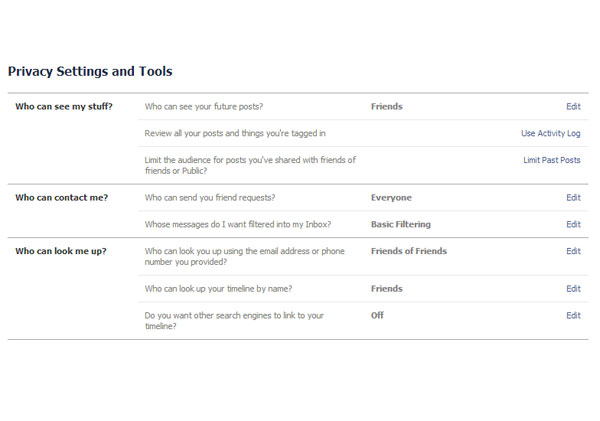Facebook Kills Privacy Option to Hide Your Profile from Strangers
Facebook is removing the privacy setting that lets users stop total strangers from finding them, deeming it an 'old' and 'confusing' option.

Facebook has quietly deleted a long-standing user privacy setting, removing one of the last obstacles to prevent complete strangers from finding each other on the pre-eminent social network.
Until now, Facebook users have been able to limit people who search for them to "Friends" or "Friends of Friends." (The default setting is "Everyone.") In other words, John Smith was able to make sure that only people who had some degree of connection to him could search for his presence on Facebook.
Now, "Everyone" — more than a billion Facebook users — will be able to search for "Everyone" else, no questions asked.
MORE: 11 Facebook Privacy Steps to Take Now
Facebook Chief Privacy Officer Michael Richter downplayed the change in a company blog posting yesterday (Oct. 10) entitled "Finishing the Removal of an Old Search Setting." He characterized the privacy option as a vestige of a more primitive time, and one that was standing in the way of progress.
"The setting was created when Facebook was a simple directory of profiles and it was very limited," Richter said, adding that it "made Facebook's search feature feel broken at times."
"People told us that they found it confusing when they tried looking for someone who they knew personally and couldn't find them in search results," he wrote, "or when two people were in a Facebook Group and then couldn't find each other through search."
Get instant access to breaking news, the hottest reviews, great deals and helpful tips.

In fact, Richter implied, the Facebook users who do limit searches to friends of friends — such as this writer — are lonely diehards about to get a wake-up call from the future.
"The search setting was removed last year for people who weren't using it," he wrote. "For the small percentage of people still using the setting, they will see reminders about it being removed in the coming weeks."
But won't the removal of this feature also remove some control over what total strangers see about individual users on Facebook?
No problem, said Richter, adding that Facebook's new settings give you much more control.
"The best way to control what people can find about you is to choose the audience of the individual things you share," he wrote, including a screen grab of the sharing drop-down menu attached to each posting dialogue box.
MORE: That's an Order! 10 Facebook Privacy Tips From the Marines
He added that users can also retroactively limit the sharing of past posts by visiting "Privacy Settings and Tools," and limit the visibility of those posts and status updates to friends or friends of friends.
Richter didn't mention the "Blocking" feature in Settings, which will still let users prevent other users from searching for them, or indeed from seeing them at all.
For example, someone who has a stalker can block that person using that person's name or email address.
Of course, that assumes the targeted user already knows he or she has a stalker. Women who are victims of Webcam hackers and "sextortionists" aren't always aware they're being watched.
Because Facebook is essentially changing its search feature from "opt-in" (to let the entire world see a user) to "opt-out" (to block certain individuals), the targeted user will just have to find out the hard way.
Online security experts, already predisposed against what they see as Facebook's slow, deliberate erosion of its users' privacy, didn't waste time commenting on the change.
"No. Wrong," wrote independent tech journalist Rob Pegoraro on Sulia.com in response to Richter's reassurances. "Things like stalking exist. It's stereotypical Silicon Valley arrogance to think that one fixed visibility level fits 1.15 billion monthly active users."
The Register's Jack Clark pointed out that "Facebook is a for-profit ad-backed company whose revenue growth depends on its users sharing as much data as possible with one another" and that "the company's main motivation is to eradicate user privacy over time."
Independent security expert Graham Cluley noted that no matter how polite Facebook is, users don't have a choice about accepting the change.
"There isn't an 'Actually, I am quite happy with things as they are. Please leave my privacy alone' option," Cluley wrote on his blog — but added that there's still something each user can do.
"Ultimately, as always with Facebook, you have to make a decision," he wrote. "Mark Zuckerberg makes the rules, you are not a paying customer, and you have no say. If you don't like the way Facebook is going, maybe you should leave the site and permanently delete your account."
Follow Paul Wagenseil at @snd_wagenseil. Follow Tom's Guide at @tomsguide, on Facebook and on Google+.

Paul Wagenseil is a senior editor at Tom's Guide focused on security and privacy. He has also been a dishwasher, fry cook, long-haul driver, code monkey and video editor. He's been rooting around in the information-security space for more than 15 years at FoxNews.com, SecurityNewsDaily, TechNewsDaily and Tom's Guide, has presented talks at the ShmooCon, DerbyCon and BSides Las Vegas hacker conferences, shown up in random TV news spots and even moderated a panel discussion at the CEDIA home-technology conference. You can follow his rants on Twitter at @snd_wagenseil.
-
Vorador2 This is one of those times i'm glad i've never caved to peer pressure and made a Facebook account.Reply -
jgalecio Glad I don't have FB... Oh wait you can actually search me now and see that I am lying.... FU FB!!!!Reply -
nokiddingboss the NSA approves this (*applause*) why not make all the uploaded pictures public while you are at it?Reply -
eklipz330 this is freaking terrible. i used that feature, to avoid friend requests. guess it has never been a better time to close it up!Reply -
timespinner Horrible. Class action lawsuit against FB for sharing data that I said was private?Reply -
wemakeourfuture @timespinner: did you read the TOS, they can change their settings if they wish. You have the right to delete your account if you don't like the service.Reply -
shopperen I have deactivated my account and filed a formal complaint with facebook. There are several people whom I will loose contact with. But it is creepy, and not in a good horror film way, to remove that feature. The only reason for, is that Graph Search will not work properly if people hide their timelines and accounts.Reply -
hannibal Try G+ it at least give you some serious options who do you deal with... I am not willing to give house keys to any trangers!Reply
-
Patrick Tobin As long as you set your posts to private I fail to see why this is a big deal? This is the same as knowing somebody's name and not knowing where they live...Reply
 Club Benefits
Club Benefits





